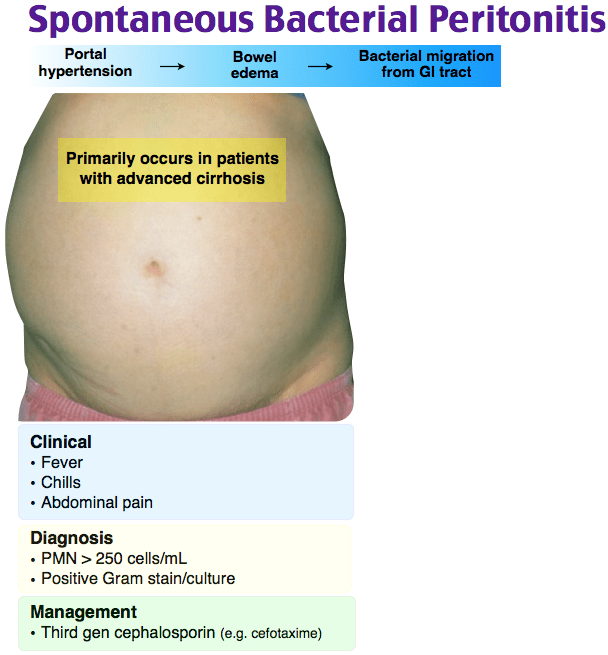The client with cirrhosis has developed spontaneous bacterial peritonitis (SBP). Which data indicates this complication of cirrhosis is occurring?
Petechiae
Increased abdominal pain
Jaundice
Blood in emesis
The Correct Answer is B
Choice A reason: Petechiae are small red or purple spots caused by bleeding into the skin, typically associated with platelet disorders, and are not a direct indicator of SBP.
Choice B reason: Increased abdominal pain is a common symptom of SBP, as the condition causes inflammation and irritation of the peritoneum, which can lead to significant discomfort.
Choice C reason: Jaundice is a sign of liver dysfunction but is not specific to SBP. It results from high levels of bilirubin in the blood and can occur in various liver diseases.
Choice D reason: Blood in emesis (vomiting) may indicate gastrointestinal bleeding, which can be a complication of cirrhosis but is not specific to SBP.

Nursing Test Bank
Naxlex Comprehensive Predictor Exams
Related Questions
Correct Answer is B
Explanation
Choice A reason: Prolonged vomiting typically leads to metabolic alkalosis due to the loss of gastric acid, which is not consistent with the ABG results showing acidosis.
Choice B reason: COPD can lead to respiratory acidosis, as indicated by the elevated PaCO2 and low pH in the ABG results, making it a likely contributor to these findings.
Choice C reason: Chronic renal failure can lead to metabolic acidosis, but the HCO3 level is within the normal range, which does not support this as the primary condition.
Choice D reason: Anxiety and hyperventilation usually result in respiratory alkalosis due to the excessive exhalation of CO2, which is the opposite of what the ABG results show.
Correct Answer is D
Explanation
Choice A reason: Learning sign language can be beneficial but may not be practical or immediately helpful for the client and spouse dealing with communication issues due to PD.
Choice B reason: Exaggerating the pronunciation of words may help some clients with PD, but it can also be tiring and not effective for all, especially if the client has significant speech difficulties.
Choice C reason: Speaking in a louder tone of voice does not necessarily improve communication with a person who has PD, as the issue often lies with the client's ability to speak, not with hearing.
Choice D reason: Writing can be an effective way for clients with PD to communicate, especially if they have difficulty speaking or being understood. It allows for clear communication without the need for verbal articulation.
Whether you are a student looking to ace your exams or a practicing nurse seeking to enhance your expertise , our nursing education contents will empower you with the confidence and competence to make a difference in the lives of patients and become a respected leader in the healthcare field.
Visit Naxlex, invest in your future and unlock endless possibilities with our unparalleled nursing education contents today
Report Wrong Answer on the Current Question
Do you disagree with the answer? If yes, what is your expected answer? Explain.
Kindly be descriptive with the issue you are facing.
